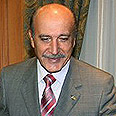
Omar Suleiman
צילום: רויטרס
Officials: Suleiman visit last-ditch effort to prevent IDF strike in Gaza
Egyptian intelligence chief due in Israel Monday morning with draft proposal for truce between Israel, Palestinian terror groups in Strip. 'This is not peace, but a temporary ceasefire that will serve Hamas and the other Palestinian terror organizations,' Minister Boim says
Egyptian intelligence chief Omar Suleiman's visit to Israel marks a last-ditch effort to try and end the Jewish state's ongoing battle with the Palestinian terror organizations without an IDF strike in Gaza, senior officials in Jerusalem said Sunday night after yet another day of rocket fire on the western Negev and harsh criticism cast on the government over its inability to stop it.
Suleiman, who serves as the chief mediator between Hamas and the rest of the Palestinian factions in the Strip, is due to arrive in Israel Monday morning with a draft of a truce agreement he had formulated with the Palestinian organizations' consent.
The Egyptian official will first present the deal to Israel's "Kitchen Cabinet" - Prime Minister Ehud Olmert, Defense Minister Ehud Barak and Foreign Minister Tzipi Livni.
Shortly after his arrival Suleiman will meet Barak at the minister's Tel Aviv home and then head to Jerusalem to meet with the PM and Livni.
The "Kitchen Cabinet" agreed that Barak would present the draft agreement to cabinet. The defense minister spoke of a possible six-month ceasefire and stressed that it would be conditioned on the complete cessation of violence against Israel, particularly with regards to the incessant rocket and mortar attacks on the western Negev, and also mentioned the need for increased efforts by the Egyptians to stop the smuggling of weapons into Gaza.
Olmert, according to officials, said Israel would agree to a truce if the Palestinian factions in Gaza would agree to halt all terror-related activity, including the arms smuggling from Egypt, stop manufacturing weapons inside the Strip and prevent Hamas from gaining even more strength.
In addition, the officials said, Israel is refusing to link the truce agreement to the IDF and Shin Bet's continued activity in the West Bank.
If these conditions are not met there will be no calm, Olmert was quoted by the officials as saying during Sunday's weekly cabinet meeting. "If there is no calm, then Israel reserves the right to act in order to protect its citizens in other ways," one official said.
Truce linked to Gilad Shalit's release?
During the cabinet meeting ministers Ze'ev Boim, Ronnie Bar-On and Avi Dichter, as well as all of the Shas ministers, voiced their objection to a truce deal.
"This is not peace, but a temporary ceasefire that will serve Hamas and the other Palestinian terror organizations, who will later resume their fire," Boim told Ynet. "We must continue to strike terror, just like we do in the West Bank, and continue to operate like a lawn mower."
A senior official in Jerusalem said "cabinet will have to decide on the matter now, or else Israel will be forced to resort to a military blow to bring quiet to the south."
All in all, officials in Jerusalem are optimistic regarding the prospects of Suleiman's proposal. The cabinet's meeting on the issue will apparently be delayed due to the expected arrival this week of several foreign dignitaries to the country, including US President George W. Bush.
Suleiman's visit also offers an opportunity to advance the Gilad Shalit issue, as the Egyptian intelligence chief also serves as a key liaison between Israel, Hamas and the IDF soldier's kidnappers in Gaza. Deputy Prime Minster Eli Yishai is expected to discuss the matter with Suleiman on Monday afternoon, and the issue is also expected to be raised during the Egyptian official's meetings with Olmert, Barak and Livni.
"One of the main dilemmas we are facing is whether or not Israel should link the truce agreement to Shalit's release," a senior official said. "So far, we do not have an answer."
Yishai, who held talks with Suleiman some eight months ago, said Sunday that "I would be willing to go anywhere they tell me and devote any amount of time to advance the kidnapped soldiers' release.
"I am willing to meet with anyone, including terror leaders and the kidnappers themselves," he said.










